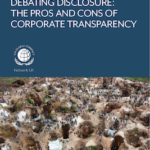Sustainability reporting is becoming more common than not among the world’s top brands, according to recent research from Global Reporting Initiative (GRI).
The organization looked at the world’s top 100 brands, as ranked by Interbrand and Business Week in the Aug. 7 issue. It found 80 percent of the top 15 global brands release reports detailing economic, environmental and social performance, using metrics developed by GRI.
Forty-three percent of the top 100 global brands also issue similar reports. "This seems to indicate that sustainability reporting is becoming a more utilized tool in maintaining and building brand often a company’s most valuable asset," GRI said Friday in a statement.
The list’s top five brands all use GRI’s Sustainability Guidelines, it said. They are Coca-Cola, Microsoft, IBM, General Electric and Nokia.
Business Week said Toyota offered a good example of a company that was able to "cast a ‘green halo’ across its entire portfolio." Toyota issues an annual GRI report detailing environmental and social performance measures.
GRI also studied the link between sustainability reporting and company size using the top 100 companies ranked in the Financial Times FT Global 500, Forbes Global 500 and Fortune Global 500. These publications use a combination of data relating to revenue, sales, profit, assets, market value and market capitalization for the compilations.
This comparison shows that companies that don’t release sustainability reports are in the minority. GRI also noticed a correlation between high profitability and sustainability reporting. Figures showed 71 percent of the top 15 ranked global companies base their sustainability reports on GRI guidelines. More than 60 percent of these top 100 companies do the same.
The GRI aims to have all organizations report on economic, environmental and social performance in the same way financial reporting is done. It developed the Sustainability Reporting Framework in a consensus-seeking process using a global network of business, civil society, labor and professional institutions.



